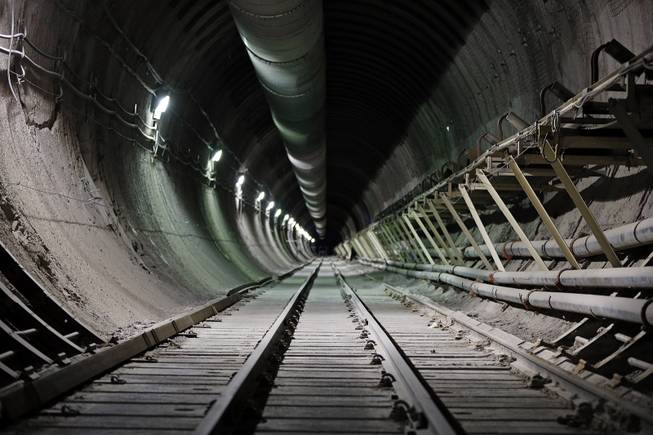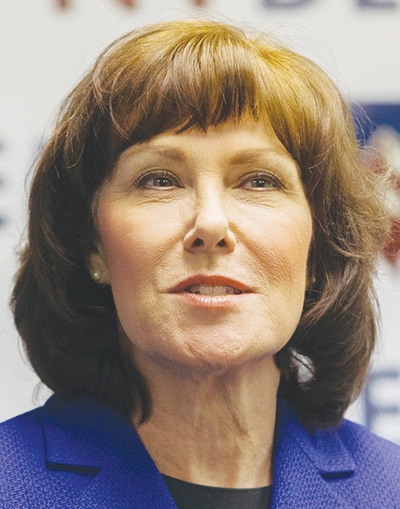
John Locher / AP
Train tracks are seen through Yucca Mountain during a congressional tour Thursday, April 9, 2015, near Mercury.
Thursday, April 26, 2018 | 6 a.m.
A group of Nevada lawmakers is preparing to request biennial legislation opposing a possible nuclear waste repository at Yucca Mountain while a congresswoman seeks to block action on the project.
Rep. Jacky Rosen, D-Nev., introduced a bill today seeking to stop Energy Secretary Rick Perry from pursuing the project, from licensing to construction, until the Office of Management and Budget can come up with alternatives for the site. The bill comes ahead of a Friday meeting of the state’s Committee on High-Level Radioactive Waste, a group that will discuss a recommendation that the state draft the 2019 version of the Legislature’s anti-Yucca Mountain resolution.
“My bill would prohibit the Department of Energy from moving forward with its dangerous and costly nuclear waste repository plan until it considers a number of other job-creating alternatives for this project,” Rosen said. “This administration should stop wasting our time and taxpayer money on this failed project, and instead find an alternative use for Yucca Mountain that creates jobs without threatening the health and safety of Nevada families.”
Nevada has opposed the Yucca Mountain project for decades and put millions toward fighting it, though some rural counties have called for the licensing process to move forward so that the science behind the project can be heard.
Yucca Mountain is about 90 miles northwest of Las Vegas in Nye County. Darrell Lacy, director of the Nye County Nuclear Waste Repository Project Office, said in a statement that the 5-mile, U-shaped tunnel is remote and unsuited for commercial activity. He said a U.S. Government Accountability Office report issued in 2011 didn’t find any alternative uses that appeared viable.
“Congress needs to provide funding and finish the licensing activities,” Lacy said. “Until a final decision on the safety of Yucca Mountain is made, it is difficult to evaluate moving forward with a nuclear waste repository or any other options.”
The bill faces an uphill battle in Congress, where Republicans are in control and President Donald Trump has called for funding to revive the mothballed project. The omnibus spending bill recently passed by Congress left out Yucca Mountain funding.
A House committee has passed the Nuclear Waste Policy Amendments Act of 2017, which deals with several issues related to Yucca Mountain. One element of the bill would allow benefits agreements between the Energy Department and state, local or tribal governments that host sites in the disposal program. A Congressional Budget Office report on the bill estimates these payments at tens of millions of dollars.
All but one member of Nevada’s congressional delegation is pushing for consent-based siting for the nation’s nuclear waste repository. Neither the House or Senate versions of the Nuclear Waste Informed Consent Act have moved past committee.
At the state level, officials have few options aside from passing symbolic resolutions, said Dan Shea, a policy specialist at the National Conference of State Legislators. Shea, who will address Nevada’s radioactive waste committee Friday, spoke with lawmakers in the group around the same time in 2016, before the Legislature convened for the 2017 session. Last year, lawmakers again passed a resolution voicing Nevada’s opposition to Yucca Mountain.
“Because states have their hands tied to a degree and there’s only so much that they can do, those resolutions are kind of the biggest opportunity for them to simply voice their position on it,” Shea said.
Shea said that to his knowledge, Nevada is the only state to pass a resolution specifically opposing Yucca Mountain. Other states have generally focused on urging the government to act to secure the nation’s spent nuclear fuel, and have stopped short of voicing support for Yucca Mountain as the solution. Shea said some legislatures have seemed sympathetic to the push for consent-based siting.
In 2017 and 2018, 30 state legislatures introduced at least 72 measures related to nuclear waste, according to NCSL. The measures mainly focused on interim storage; a permanent repository; financial penalties for companies still storing waste onsite; moratoriums on new construction until a process is in place to dispose of the high-level nuclear waste; and emergency preparedness and safety.
Shea said three out of six states that passed moratoriums pending a waste disposal process have since repealed the laws.
“It’s sort of in the federal government’s court to a degree in order to address some of those larger outstanding issues like interim storage or a permanent repository,” Shea said. “States are definitely interested in that moving forward and there’s no specific policy that they’re in favor of, aside from … getting the ball moving, especially as nuclear plants shut down.”

